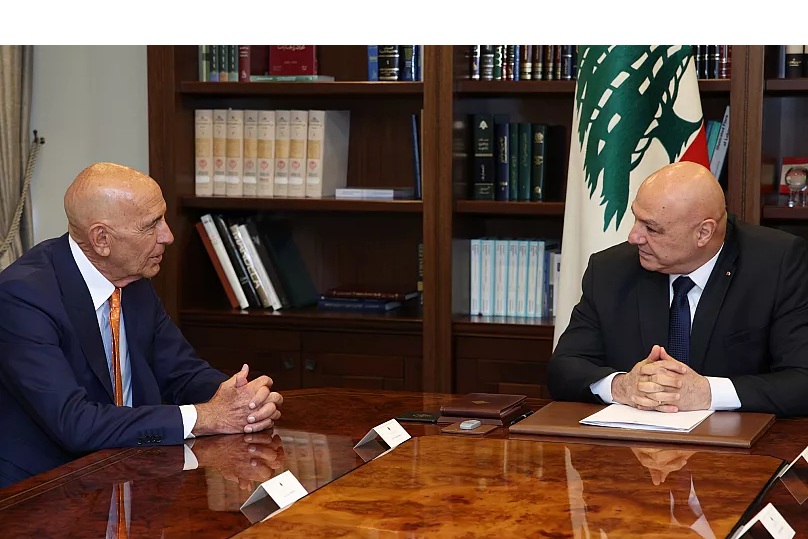A senior U.S. envoy has expressed strong approval of Lebanon’s reaction to a recent American proposal that seeks the disarmament of Hezbollah, even as Israel maintains a significant military presence within Lebanese territory.
Thomas Barrack, an advisor to U.S. President Donald Trump, currently serving as Washington’s ambassador to Turkey and special envoy for Syria, returned to Beirut on Monday, July 7, 2025, after presenting the U.S. plan during a visit on June 19.
The proposal called for Hezbollah, the Shiite militant group and political party in Lebanon, to completely disarm within four months.
In exchange, Israel would halt its airstrikes and withdraw fully from the five military positions it still occupies in southern Lebanon.
Speaking to reporters following a meeting with Lebanese President Joseph Aoun, Barrack praised the Lebanese government’s response as “spectacular,” especially given the short timeframe.
“I am unbelievably satisfied with the reply we received,” he said.
Although Barrack confirmed that Lebanon’s response came in the form of a detailed seven-page document, he declined to share any specifics about its contents.
Barrack also expressed optimism that both Lebanon and Israel are pursuing a path toward reducing tensions.
“Both countries seem to be aiming for a stand-down agreement, a cessation of hostilities, and ultimately, a path toward peace,” he remarked.
His comments come amid ongoing volatility, as Israel continues to conduct airstrikes across Lebanon despite an official ceasefire that was reached in November.
The hostilities between Israel and Hezbollah reignited in October 2023, after Hezbollah launched attacks in solidarity with Palestinian militant group Hamas during its conflict with Israel in Gaza.
The violence escalated rapidly into a full-scale war by the following September.
This resulted in over 4,000 deaths, including Hezbollah’s leader Hassan Nasrallah and other senior figures, and displacing nearly 1.4 million people, according to Lebanese government sources.
Earlier this year, Lebanon’s newly instated president and prime minister vowed to bolster state authority and strengthen the Lebanese Armed Forces.
Both leaders underscored the necessity that Hezbollah, historically Lebanon’s most powerful military faction, must not surpass the official government in power or influence.
Despite these promises, Israeli strikes on Lebanese territory have continued unabated, with Israel justifying its actions as preventative measures against Hezbollah’s attempts to rearm.
Since the ceasefire, Lebanese health authorities report that roughly 250 people have been killed and over 600 wounded due to Israeli attacks.
Hezbollah has yet to provide a formal response to the U.S. disarmament plan.
However, its deputy leader, Naim Qassem, publicly rejected any notion of disarmament while Israeli military aggression persists.
Addressing thousands of supporters during Ashura commemorations in Beirut’s southern suburbs, Qassem declared:
“We cannot be asked to soften our stance or lay down arms while [Israeli] aggression continues.”
Barrack acknowledged that for Hezbollah to consider disarmament, guarantees would be necessary to ensure the group’s continued political role within Lebanon’s government and society.
Yet, despite diplomatic overtures, the situation on the ground remains tense.
In fact, just hours before Barrack’s arrival in Beirut, Israel launched multiple airstrikes across southern and eastern Lebanon, coupled with a ground incursion into a border village.
Lebanese officials and diplomats suggested that these recent military maneuvers were intended to ramp up pressure on Hezbollah ahead of ongoing diplomatic negotiations.
On Saturday, Lebanon’s Ministry of Public Health reported an “Israeli enemy drone attack” on a vehicle in Saf al-Hawa.
Saf al-Hawa is a region in southern Lebanon’s Bint Jbeil district, which resulted in one death and two injuries.
Earlier the same day, another Israeli drone strike wounded a person in Shebaa, a town near Lebanon’s border with Syria and the Israeli-occupied Golan Heights.
The attack reportedly struck a residential house, according to Lebanon’s National News Agency.
Further, the ministry confirmed that an Israeli drone strike targeted Chaqra, also in Bint Jbeil, wounding two individuals.
The violence continued the previous Thursday when an Israeli attack near Beirut killed at least one person and injured three others.
The unfolding developments underscore the fragile nature of the ceasefire and the immense challenges involved in steering both Lebanon and Israel toward lasting peace.
While U.S. envoy Barrack’s diplomatic efforts are a hopeful sign, the persistent violence highlights how tenuous the situation remains and how deep-seated mistrust between the parties continues to hamper meaningful progress.







